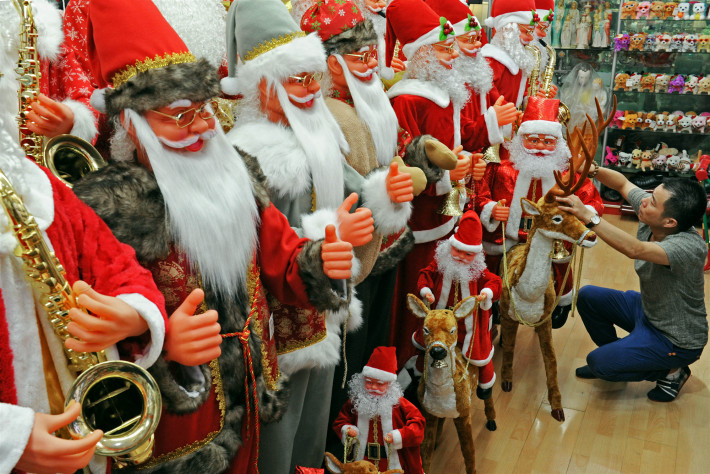|
||||||||||
| Home Nation World Business Opinion Lifestyle ChinAfrica Multimedia Columnists Documents Special Reports |
|
||||||||||
| Home Nation World Business Opinion Lifestyle ChinAfrica Multimedia Columnists Documents Special Reports |
| ChinAfrica |
| Jingle All the Way |
| Santa Claus is coming to town and it seems like he's here to stay |
| By Francisco Little | VOL.10 December ·2018-11-30 |

No shortage of Santas in China (XINHUA)
If you didn't know by now, Santa has a soft spot for China. From early November, the plastic cut outs of his rosy cheeks, piercing blue eyes and frothy beard watch you from every doorway, window and shop front. Some have even remained posted from the previous year. Christmas decorations become the most competitive game in town, with no self-respecting business wanting to be left behind breathing in tinsel dust.
Golden balls, flashing lights and white plastic Christmas trees have all come to the party in infinite numbers. Hotel lobbies and shopping malls are an extravaganza of sense stimulation - glitz and choirs singing carols pump up the volume wherever five stars are found. And mind not to trip over the life-sized faux Santa statues that wave hands and utter guttural ho-ho-ho's to entice shoppers.
A scant two decades ago, most people in China had little idea about Christmas or what it represented; in the minds of some, it was simply associated with capitalist behavior. The notion of Christmas being a religious holiday to commemorate the birth of Christ still goes largely unknown. It is instead celebrated as another embraced Western tradition to have a party, meet up with friends and exchange the multitude of promoted gifts available online.
Shengdan laoren (Christmas Old Man) might even put in an appearance in some families to drop presents into muslin stockings or entertain office workers who welcome the break. Christmas with Chinese characteristics.
While it is difficult to find accurate figures for the number of Christians in China, some of them celebrate by illuminating their houses with paper lanterns and decorating their Christmas trees, known as "trees of light," with lanterns, flowers and chains all cut from paper.
But with all traditional celebrations the world over, when the veneer of religious or cultural camouflage is scraped off, the bottom line is for retail barons to encourage spending.
Come late November, hotels of every description in Beijing are out in the market place promoting their Christmas dinners. The competition to attract taste buds leaves no Christmas pudding unturned. But dig deep, as prices are not for the faint-hearted. A decent spread at most upmarket hotels will set you back between $150 to $250 - bon appétit. Christmas in China seems to start the whole chain of marketing and promotional events that stretches from late November to Chinese New Year and Saint Valentine's Day in mid-February. It's a time for anyone selling anything to milk the festivities for all they're worth, and the public are kept seduced with bargains, sales and specials in all their creative guises.
When the teller at a supermarket that caters for foreigners in Beijing greets you, she is wearing a Christmas hat that perches awkwardly on her head. She manages a smile and an enthusiastic "Merry Christmas," having been seemingly told to say that to every foreign customer. I appreciate the greeting for the effort if nothing else and despite the commercialism it made me feel good. It resonates subtly with the Christmas carols that are piped into every shopping mall, restaurant and coffee shop.
That set me thinking about how cultural celebrations all have a similar intention. They revolve around feeling good and getting together with people you care about. Ironically, the further we move from the source of the celebration, the more eager we seem to celebrate it. So the celebration becomes the reason and not the source. It is an extension of modern behavior and has little to do with disrespect of tradition. Celebration by design. From the heart of Beijing, the explosive commercialism that is Christmas has mushroomed countrywide and is labelled by some as a Chinese phenomenon. What probably began in the past as a way of garnering business with foreign visitors has taken on a life of its own, been assimilated and become a Chinese version of a birth that was celebrated in Bethlehem 2018 years ago. On a positive note, at least most people in China now know the words to Jingle Bells...
(The writer is a South African living in Beijing)
| About Us | Contact Us | Advertise with Us | Subscribe |
| Copyright Beijing Review All rights reserved 京ICP备08005356号-5 京公网安备110102005860号 |